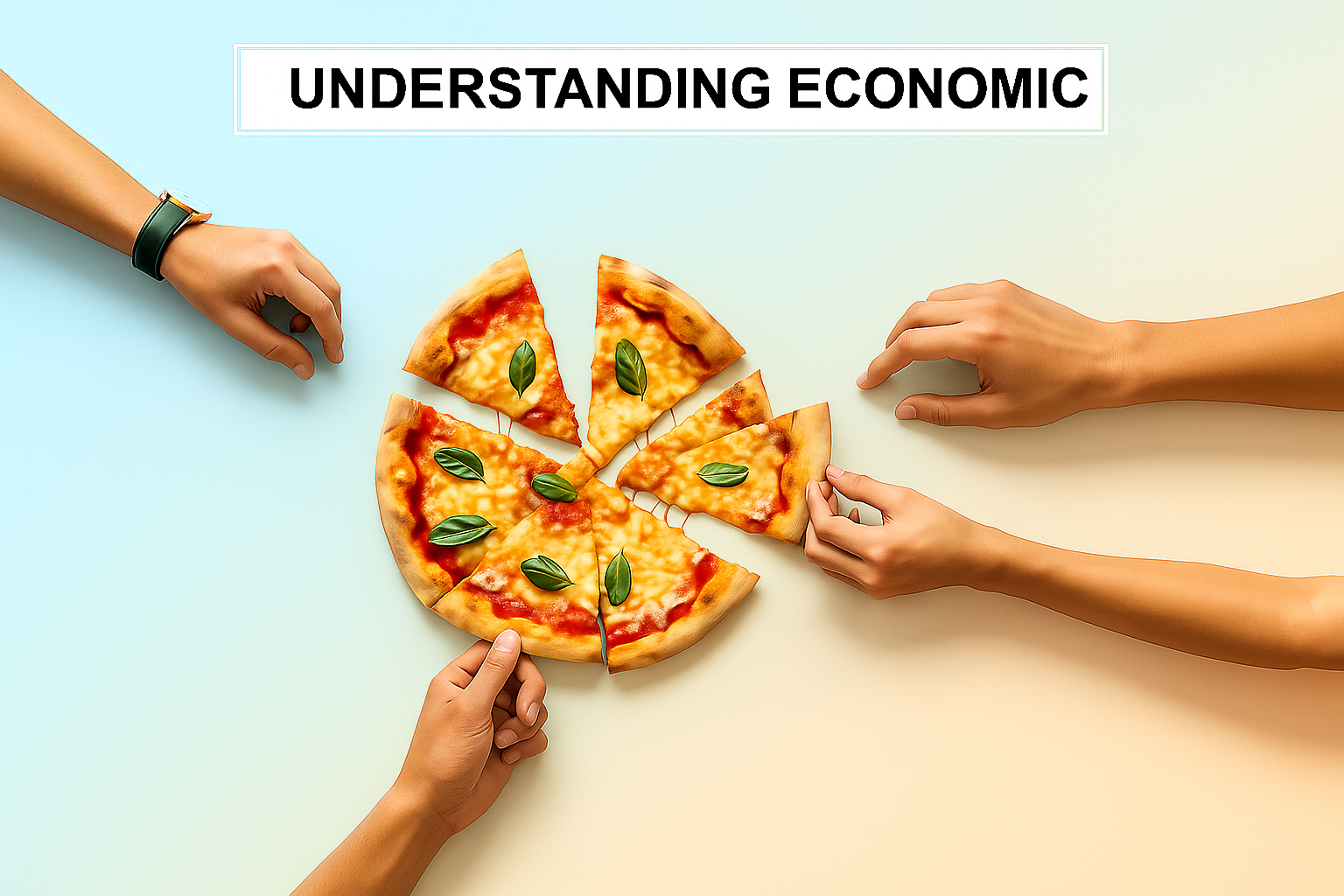The Pizza Test - How to Actually Understand Political Economy
Stop memorizing isms. Use this one mental model to understand any economic system in 30 seconds.
The Pizza Test - How to Actually Understand Political Economy
Every political argument you’ve heard is actually about one thing: who gets the pizza and why. Not metaphorical pizza. Literal pizza. Put ten people in a room with one pizza, and you’ll witness every economic system humanity has invented.
Most people memorize definitions. “Capitalism is private ownership of means of production.” Useless. Here’s what actually matters: What happens when resources are scarce and humans compete?
The Primitive Truth Nobody Admits
Society is just people sharing things. That’s it. No society exists when you’re alone. Add your sister? You become a dictator. Add ten siblings? Power dynamics emerge. Add a million strangers? You get economics.
Every economic system is just a different rule for dividing the pizza:
Classical & Market-Based Systems
Capitalism: Grab what you can before others do. Fastest eater wins.
Laissez-faire Capitalism: No rules at all. Pure pizza chaos.
Welfare Capitalism: Grab what you can, but everyone gets at least one bite.
Social Democracy: Competitive pizza eating, but losers get welfare slices. State Capitalism: Government grabs the pizza, sells slices back to you.
Neoliberalism: Whoever bid highest yesterday gets today’s pizza.
Mercantilism: Hoard all pizzas, trade crusts to neighbors for gold.
Ordoliberalism: Free-for-all, but referee ensures nobody takes whole pizza.
Collectivist & Socialist Systems
Socialism: Everyone gets equal slices, period. Democratic Socialism: Vote on slice sizes, then share accordingly.
Market Socialism: Workers at pizza shop decide prices and portions.
Communism: No ownership. Pizza belongs to everyone, distributed by need.
Marxism-Leninism: Revolutionary vanguard seizes pizzeria, redistributes pizza.
State Socialism: Government owns pizzeria, rations slices by formula.
Anarcho-syndicalism: Pizza workers’ union runs everything, no bosses.
Why does capitalism dominate? Simple. While the communist committee debates distribution, the social democrats vote on portions, and the anarchists argue about hierarchy, the capitalist already took half the pizza. Aggression beats deliberation in resource competition.
What type of world do you want to live in?
The answer is complex. Most people want to live in a world where everyone shares and have enough for everyone. But, we know that’s not possible. Even me, I won’t be able to give up most of the things to share with suffering children of Africa and war stricken middle east. It’s close to impossible to go back in living standards even when I know I am at top 0.001% of the world.
The New Game: Who Controls the Oven?
Here’s what changes everything - what if the pizza maker joins the room? Now we’re not just fighting over slices. We’re dealing with whoever controls production.
Mixed & Hybrid Models
Corporatism: Pizza company, workers, and state negotiate who gets what.
Corporatocracy: Pizza Hut writes the rules about pizza distribution.
Techno-feudalism: You rent pizza access through an app that takes 30%.
Alternative & Emerging Systems
Georgism: Eat what you want, but pay rent for the table space you occupy.
Distributism: Everyone gets their own mini pizza oven.
Green Economics: Only sustainable, organic pizza. Limit slices to save planet.
Participatory Economics: Pizza council votes on every topping and slice.
UBI Models: Everyone gets one guaranteed slice, compete for the rest.
This is techno-feudalism. This is corporatocracy. Amazon doesn’t just compete for market share; it owns the marketplace. Google doesn’t fight for attention; it controls discovery. The new economy isn’t about grabbing pizza faster - it’s about owning the only oven in town.
The Three-Layer Model Everyone Confuses
Stop mixing these up:
Economic System: How you split the wealth (the pizza rules)
Political System: How you govern the group (who enforces the rules)
Legal System: How you regulate behavior (what happens to rule-breakers)
A democracy can run capitalism or socialism. An autocracy can too. China runs “capitalism with Chinese characteristics” under single-party rule. Singapore combines authoritarian politics with free markets. The combinations matter more than the labels.
The Counterexample That Proves the Rule
“But Nordic countries!” people shout. Yes, Sweden works. Small, homogeneous populations with high trust can share pizza equally. Try that with 300 million Americans from different backgrounds. The pizza-sharing rules that work for a family dinner don’t scale to a food court.
Resource abundance also breaks the model. When there’s unlimited pizza, distribution methods matter less. This is why tech disruption temporarily creates “everyone wins” scenarios - until the abundance ends.
Your Pizza Audit Framework
Next time someone debates economic systems, run this test:
- Scarcity Check: Is there enough pizza for everyone?
- Speed Analysis: Who moves fastest when pizza arrives?
- Production Control: Who owns the oven?
- Enforcement Reality: Who actually stops the biggest guy from taking everything?
- Scale Factor: Does this work with 10 people? 10,000? 10 million?
The system that wins isn’t the fairest or most logical. It’s the one that matches human nature at scale. Currently, that’s capitalism grabbing slices while techno-feudalism builds monopoly ovens.
Action Step: Next group dinner, announce you’re testing economic systems. Watch how quickly “civilized” people reveal their true resource-competition strategies. Report back what you discover about human nature.
